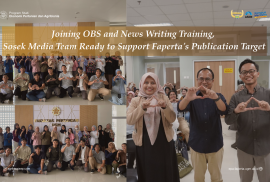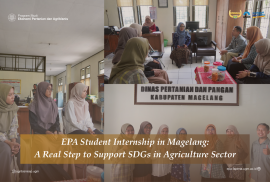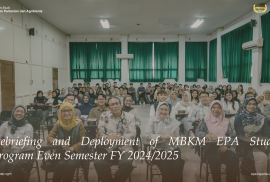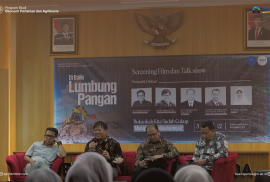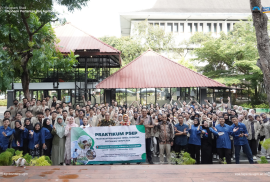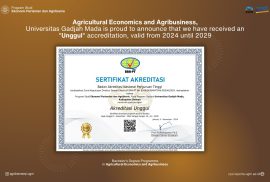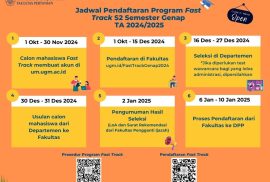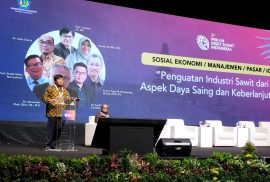Yogyakarta, April 25, 2025-In order to improve content production and news writing skills, the Department of Agricultural Social Economics (Sosek) Media Team consisting of Adinda, Adhika, April, Inay, Mila, Mirda, Manda, Dinda, and Arsya participated in the “Open Broadcaster Studio (OBS) and Article Writing Training” organized by the Faculty of Agriculture UGM on Friday (25/04/2025). Located in Co-working Space 1 AGLC 6th Floor, this training was attended by the Faculty Media Team and Media Teams from various departments.
ugm
Magelang, April 22, 2025 – The supervisor team of the Merdeka Learning Campus Merdeka (MBKM) Internship Program from the Agricultural Economics and Agribusiness Study Program (EPA), Faculty of Agriculture, Gadjah Mada University, carried out monitoring and evaluation activities for students who were undergoing the MBKM internship program at the Agriculture and Food Service Office of Magelang Regency.
During this visit, the accompanying lecturers discussed directly with the DPP of Magelang District, including the Head of the General and Personnel Subdivision, to review the development and contribution of students over the past two months. Currently, students are placed in several Agricultural Extension Centers (BPP) in various sub-districts and are scheduled to complete their placement in BPP on May 7, 2025.
Yogyakarta, February 7, 2025 – The Department of Agricultural Social Economics (Sosek) of Gadjah Mada University carried out the Debriefing and Deployment of Independent Students Learning Campus Merdeka (MBKM) for students of the Agricultural Economics and Agribusiness (EPA) Study Program and Agricultural Extension and Communication (PKP) class of 2022. The event, which took place at the Sosek Building, Faculty of Agriculture, aims to equip students with essential knowledge and skills before they go directly into the world of work through the MBKM program.
Regina Claudia, an Agricultural Economics and Agribusiness Study Program student, is one of eight participants in the SUIJI-SLP Program representing UGM. The Six University Initiative Japan-Indonesia Service Learning Program (SUIJI-SLP) is a collaborative program between 3 universities in Indonesia (UGM, IPB, and Unhas) with 3 universities in Japan (Ehime University, Kagawa University, and Kochi University).
Regina said that the SUIJI program offers the opportunity to learn directly from the local community to understand their cultural values and lifestyles. “It turns out that learning Japanese culture directly from the Japanese people is mindful and meaningful!” she said.
On December 5, 2024, the Auditorium of the Faculty of Forestry, Universitas Gadjah Mada (UGM) became the venue for a discussion and screening of a documentary film that raised important issues related to Indonesian food security. The event was organized by UGM Channel, with the documentary film title “Behind the Food Barn: Aren’t We Already Capable Enough to Face It?”.
This documentary film examines how people on the outermost islands of Indonesia struggle to maintain their food sovereignty with the challenges of globalization and climate change. After the screening of the film, an in-depth discussion was held. One of the discussion initiators at the event was Prof. Dr. Jamhari, S.P., M.P. as a professor from the Agricultural Economics and Agribusiness Study Program UGM who is also known as an expert in the field of food security.
Students of the 2022 Agricultural Economics and Agribusiness Study Program conducted an Agricultural Socio-Economic Assessment Practicum in Gunung Kidul Regency on November 1-4, 2024. The activity aims to provide students with information on the socio-economic conditions of farmers in Gunungkidul Regency through surveys and direct interviews with farmers.
The Agricultural Socio-Economic Assessment Practicum has a series of activities that allow students to have reliable academic abilities. After conducting field practicums by interviewing farmers, students then write the results of their studies in the form of a scientific report containing the general conditions of the area, characteristics of respondents, analysis of social conditions, analysis of costs, income, profits of farming businesses and the level of farmer welfare. This is expected to provide students with an overview of the portrait of farming businesses in Gunung Kidul Regency and the conditions of farmers’ households. To facilitate the implementation of the practicum, students are accompanied by a practicum assistant and a supervisor. The series of practicum activities are closed with an exam with a lecturer in the form of a presentation of the results of the analysis.
With the spirit of international collaboration, the EPA Study Program implements case-based learning in the agribusiness management course. The implementation of case-based learning is carried out to prepare EPA Study Program students to face global challenges. The class involves students from three countries, namely Indonesia, Japan, and South Korea. They succeeded in formulating innovative solutions to actual problems in the agribusiness sector.
The activity, which was held on November 26, 2024, carried two main themes, namely production risk management and human resource management. Students were divided into two large groups to explore each theme. By using a case-based learning approach, they were required to analyze real cases in the agribusiness industry, formulate problems, and design effective solutions from three countries, namely Indonesia, Japan, and South Korea.
On November 5, 2024, the Agricultural Economics and Agribusiness Study Program successfully achieved “UNGGUL” Accreditation from BAN-PT (National Accreditation Board for Higher Education). The accreditation was determined based on the Decree of BAN-PT Number 6549/SK/BAN-PT/Ak.KP/S/XI/2024 concerning the Conversion of Accreditation Rankings for the Agricultural Economics and Agribusiness Study Program in the Undergraduate Program at Universitas Gadjah Mada, Sleman Regency. This accreditation is valid from November 5, 2024 – July 10, 2029. This achievement proves the commitment of the UGM Agricultural Economics and Agribusiness Study Program to support the Sustainable Development Goals (SDGs) point 4, namely quality education.
Hello #SobatEPA!
Do you know about the Fast Track Program? The Fast Track Program is an accelerated study program for undergraduate students (S1) to be able to continue to the master’s level (S2) so that they can complete their undergraduate (S1) and master’s (S2) studies in just 5 years! Interesting, isn’t it?
The Fast Track Program is open to all students of the UGM Faculty of Agriculture who are interested in continuing their studies in the master’s program at the UGM Faculty of Agriculture. There are two Master’s Programs in the UGM Department of Agricultural Socioeconomics, namely a Master of Agricultural Economics and a Master of Agribusiness Management.
Prof. Jamhari, a distinguished expert in the Socio-Economics of Agriculture at UGM, was a key figure at the 8th Indonesian Palm Oil Research Week 2024. The event was held on 3-4 October 2024 at the Bali Nusa Dua Convention Center (BNDCC). The theme of the event was “Green Gold: Transforming Palm Oil Industry through Cutting-Edge Technologies”. This event is expected to introduce the latest research innovations on palm oil to stakeholders in the palm oil industry, such as the government, private sector, academics, and the wider community.

